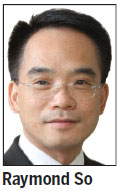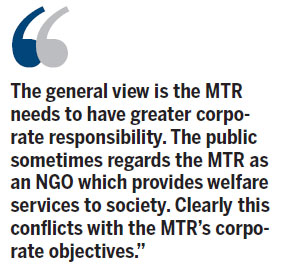MTR urgently needs to improve public image
Updated: 2014-05-01 06:30
By Raymond So(HK Edition)
|
|||||||||
The Mass Transit Railway (MTR) used to be regarded as a highly reliable, efficient mode of public transport in Hong Kong. However, the MTR has had some bad luck recently. Each day there is news about the MTR experiencing minor defects which cause delays and inconvenience to passengers. These incidents have sparked public concern that the MTR is struggling with its operations.
The MTR used to have a superb reputation. When we compare its operations with those in other international cities, it was among the world's best subway operators. We had punctual, clean, and safe service from the MTR. The fares were also very competitive by international standards.
The superior standards of the MTR could be seen in its operation of the Ngong Ping 360 cable car. Before the MTR took over the cable car, its performance was unsatisfactory. Accidents were occurring too often. But after it was run by the MTR, these problems seemed to disappear.

Many people have contributed to the efficient running of the MTR. But recent incidents are now hurting its reputation. People are also starting to question whether the MTR has management problems. The organization urgently needs to revamp its corporate image, and act decisively to restore people's confidence.
As mentioned before, the service quality of the MTR is among the best in the world. Its operations are frequent and busy. MTR trains transport millions of people each day. But simple mathematics shows that sooner or later the MTR will have problems with its operations. Because the MTR transports so many people, there is always going to be the chance that some problem will occur. Unfortunately people are not sympathetic to the MTR. They "feel" the service quality is deteriorating.
A critical issue is that MTR fares rise each year. When people take note of increasing fare rises, together with recent service failures, they inevitably become very critical of the MTR.
In terms of its public image, a major source of discontent is also the MTR's status as a listed company. Because it is a listed company, the MTR has to be responsible to its shareholders. The MTR needs to be proactive in making profits, and so tries to maximize fare incomes.

The MTR has tried very hard to show corporate responsibility and has offered substantial rebates to passengers. Nevertheless, people's perceptions are that the MTR is not trying hard enough to lessen the burden on passengers. But the managers of the MTR are actually performing well. They are defending the legal rights of shareholders. Nevertheless, many passengers do not agree. The general view is the MTR needs to have greater corporate responsibility. The public sometimes regards the MTR as an NGO which provides welfare services to society. Clearly this conflicts with the MTR's corporate objectives.
The annual fare increases have caused public anger. But the MTR knows this. The problem is that the MTR is now used to its critics and has become indifferent to them. So the gap between the performance of the MTR and the expectations of the public widens.
This discontent is often hidden when things go smoothly. However, when there are incidents which inconvenience people, public anger erupts. It is not surprising to see so much negative coverage of the MTR recently. The problems it faces certainly have real causes, but public discontent just makes them worse.
The MTR urgently needs to revamp its corporate image. Its engineers do technical jobs well. But rebuilding its public image will take a long time. The MTR still faces a difficult time. The government should take a more proactive role in monitoring it. There are already many guidelines for monitoring MTR operations. But the government needs to act now to reduce public discontent.
The author is dean of the School of Business at Hang Seng Management College.
(HK Edition 05/01/2014 page8)